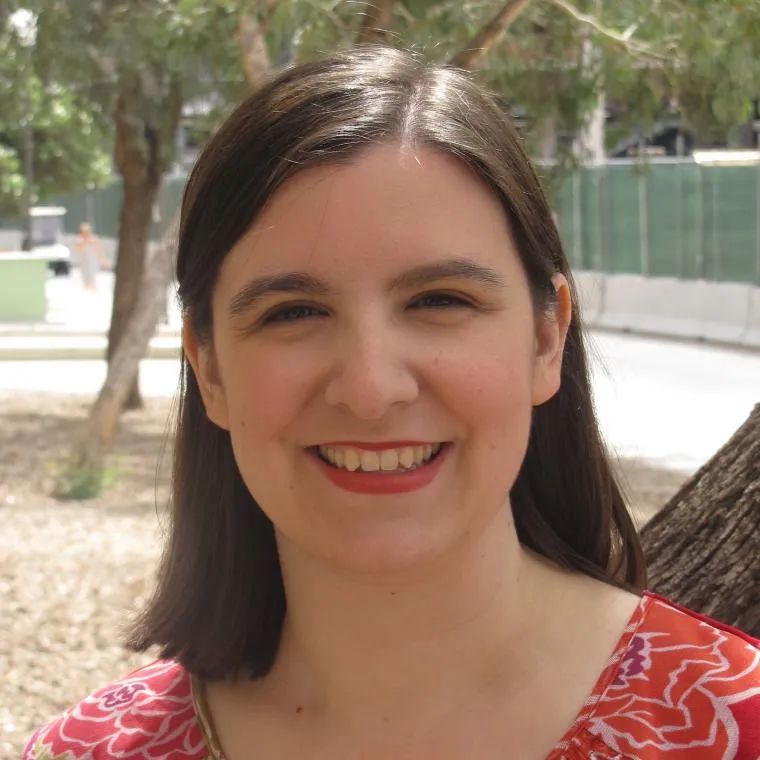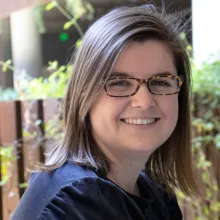Molly Bolger

Note: Titles and affiliations appear as they were at time of award.
Supporting Teaching Assistants' Implementation of a High-Impact, Open-Inquiry Curriculum
As a Hispanic Serving Institution, UArizona has the opportunity to impact the diversity of the STEM workforce, but STEM persistence remains a challenge. Research shows students’ science identity and self-efficacy improve persistence in STEM majors. Yet, to support development of these factors science educators must significantly rethink how we develop curricula. Through piloting AIM-Bio, our Authentic Inquiry through Modeling in Biology curriculum, we discovered students experienced increased science identity, ownership of their ideas, and a greater likelihood of persisting in STEM several semesters after the experience. As we scale up AIM-Bio, which engages students in a research community within their introductory lab course, a challenge is training large numbers of teaching assistants (TAs) to mentor students in authentic inquiry, something TAs often struggle with, preferring more traditional views of teaching. This project aims to: 1) Build a professional development program to support TAs in implementing our inquiry curriculum, AIM-Bio; 2) Conduct research to reveal the classroom methods TAs actually use when they implement the AIM-Bio curriculum; 3) Assess student outcomes from the AIM-Bio scale-up, addressing how variation in implementation by TAs may affect these outcomes.
Project Outcomes
The focus of this CUES project was to enable large-scale implementation of a laboratory curriculum (AIM-Bio) that provides introductory biology students with the chance to practice legitimate scientific inquiries. This type of opportunity is important for students’ development as scientists and for STEM persistence. However, research opportunities through traditional means, such as individual mentoring, have a limited capacity and can result in inequitable access for students. A primary CUES project outcome was support for curricular scale-up, especially focused on developing and testing an innovative professional development (PD) program for teaching assistants. This PD program helped TAs to re-think their role in the classroom to focus on mentoring students in the process of science, rather than delivering facts through direct instruction. A second project outcome was research on laboratory instructor reasoning. Our research: 1) revealed diverse instructor intentions and classroom actions for science practice-based instruction 2) established the Classroom Research Mentor Framework to understand how instructors can act as mentors in the science classroom, and 3) demonstrated how different TAs view the role and purpose of laboratory learning and how these views can change over time.
A third project outcome was assessment of how laboratory curricula can directly impact students’ scientific development. Through the process of scaling AIM-Bio, we had the unique opportunity to directly compare outcomes for over 1,400 students who were enrolled in the same course and randomly chose sections that were using the AIM-Bio or a traditional laboratory curriculum. Our quantitative and qualitative analysis revealed a strong positive impact of the AIM-Bio curriculum on factors that are associated with STEM-persistence (Science Self-Efficacy, Science Identity, and Science Values). The impact of laboratory curriculum on Self Efficacy was particularly evident among Underrepresented Minority students, and suggested the potential importance of this type of opportunity for meeting community goals to build diversity in STEM fields. Future studies will: 1) Further investigate TA instruction to build models of TA learning 2) Look directly for the impact of different forms of instruction on student learning outcomes, and 3) Follow laboratory students’ STEM persistence over time to determine the potential impact of curriculum.

Lexie Cooper
Graduate Research Associate, Molecular and Cellular Biology
Lexie Cooper is a PhD student in the Molecular and Cellular Biology department at the University of Arizona and a graduate research associate working on the CUES Supporting Teaching Assistants' Implementation of a High-Impact, Open-Inquiry Curriculum project. Her work on the project aims to understand how teaching assistants navigate supporting students in scientific practices as they teach this open-inquiry curriculum.
Jordan Osness
Bio and headshot not available.
Publications
Cooper, A.C., Southard, K.M., Osness, J.B., and Bolger, M.S. (2022). The Instructor’s Role in a Model-Based Inquiry Laboratory: Characterizing Instructor Supports and Intentions in Teaching Authentic Scientific Practices. CBE—Life Sciences Education, 2022 21:1. DOI: doi.org/10.1187/cbe.21-07-0177.
Bolger, M., Osness, J., Gouvea, J., Cooper, A. (2021). Supporting Scientific Practice through Model-Based Inquiry: A Students’ Eye View of Grappling with Data, Uncertainty and Community in a Laboratory Experience. CBE—Life Sciences Education, 2021 20:4. DOI: doi.org/10.1187/cbe.21-05-012.
Presentations
OCT 2022: How do TAs Learn to Teach Inquiry-Based Labs? Insights from Research & Practice, CUES Inside UAZ-Funded Scholarship Series, University of Arizona, Tucson, AZ.
JUL 2022: The role of instructor intentions in understanding how TAs learn to support students in model-based inquiry. Society for Advancement of Biology Education Research (SABER) Annual Meeting 2022, Hosted by University of Minnesota, Minneapolis, MN.
JAN 2022: Rethinking the Purpose of Laboratory Courses: What do students gain from Authentic Inquiry? Hosted by the Department of Chemistry & Biochemistry, University of Arizona, Tucson, AZ.
OCT 2020: Bringing the Benefits of Undergraduate Research to an Introductory Lab Course via the AIM-Bio Curriculum (Invited Seminar), Department of Biology Seminar at University of Alabama Birmingham (UAB).
OCT 2020: Engaging Undergraduate Students in Authentic Inquiry in a Classroom Setting: How do we do it and what do students get out of it? (Invited Seminar), STEM Transformation Institute: Florida International University.
JUL 2020: Model-based inquiry instruction: A mentoring framework for supporting students in the scientific practice of modeling (Poster Presentation), Society for the Advancement of Biology Education Research Annual Conference. Minneapolis, MN.

